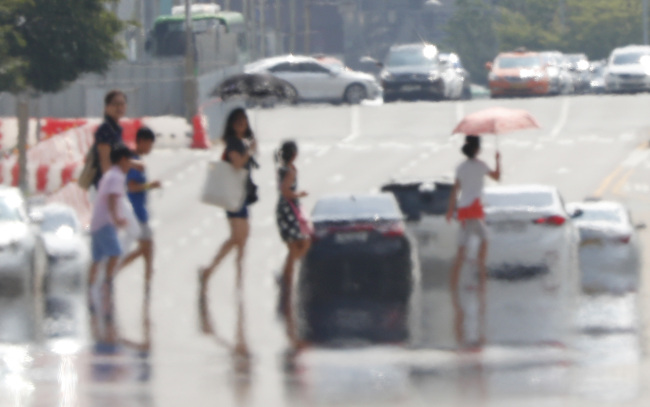Blistering summer causes highest hot weather death toll
The average temperature in Seoul from Aug. 1-15 was 29.8 degrees Celsius this year, the highest since the nation started documenting daily weather in 1907.
As of Aug. 15, 16 Koreans have died of heat-related causes, such as heat stroke.
In 2012, 15 people died of heat-released diseases. The number was 14 in 2013 and one in 2014. Last year, 11 lives were lost to heat-related illnesses.

Heat wave warnings have been issued by the Korea Meteorological Administration in Seoul for 11 consecutive days since July 31. The warning is issued when the daytime high hits 33 degrees Celsius and continues for at least two days.
As of Aug. 15, 1,800 individuals had suffered heat-related diseases, which is 1.7 times higher than the total number of patients treated for the condition last year and 3.2 times higher than the number treated in 2014.
Among all patients reported this year, the highest proportion of them, 26.8 percent, were those aged 65 or above. In addition, 21.2 percent of the patients developed heat-related diseases while staying indoors, and 28.1 percent developed them between 6 p.m. to 10 a.m. the next day.
Lack of air conditioning and the so-called “tropical night” phenomenon -- defined by nighttime low temperatures staying above 25 degrees Celsius -- are considered some reasons behind the statistics.
This year also saw the highest number of ozone warnings being issued -- 202 times as of August -- since the alert was introduced here in 1995.
Ozone, a gas found in air pollution, is known to cause breathing attacks, indigestion and nausea in many people, especially children and seniors. In general, hot and sunny weather conditions increase the likelihood of high ozone concentrations.
To avoid heat-related illnesses, the KCDC advised drinking plenty of fluids and wearing loose-fitting, lightweight clothing. When one cannot avoid staying outdoors in the hot weather, it is important to rest frequently in a cool spot and drink enough water, it added.
The agency also stressed that heatstroke is a serious medical emergency and can be life-threatening.
“If you see someone who has lost consciousness after being outdoors in hot weather, make sure you call 119 -- the Korean version of 911 -- and seek emergency and professional help,” health authorities said in a statement.
By Claire Lee(dyc@heraldcorp.com)
本文地址:http://x.zzzogryeb.bond/html/03b199912.html
版权声明
本文仅代表作者观点,不代表本站立场。
本文系作者授权发表,未经许可,不得转载。